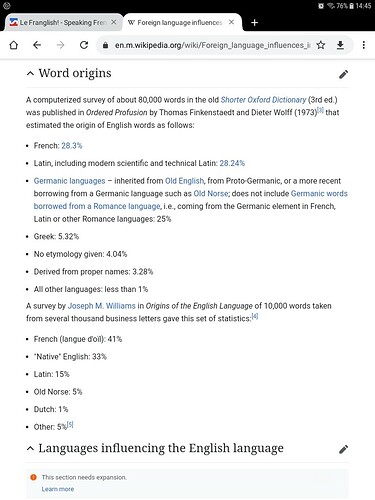A friend of mine, who loves to chat, moved to France and was soon speaking basic French. Her vocabulary wasn’t broad so when she didn’t know a particular French word she would just say the English word and everyone seemed to understand her! I think too many of us are too worried about not saying every single French word correctly.
I agree! I have very rusty O level French from 40+ years ago. I find I have got over the embarrassment of trying to speak bad French and usually start with an apology for my poor French followed by a cobbled conversation which usually gets me understood. I compare it to speaking to a non-English person speaking to me in very poor English. If you understand roughly what someone is saying, you fill in the gaps between you! That said, a lot gets lost in translation and misunderstandings occur but my confidence is definitely getting better! So does anyone know where I could go for conversational French lessons (or better) near me in Haute-Vienne (87) as I really would like to become more fluent as the months and years pass. Or maybe recommend a good online course? Any suggestions welcome!
Hi Joan, I would suggest you put a notice in local shops asking for French people who want to learn conversational English. You can help each other and it doesn’t cost anything and you may make friend.
Izzy x
I’ve found DuoLingo very helpful for getting my brain re-engaged in the basics of French. I’m told that it’s not great for grammar, but I seem to get by with a quick apology and the odd English word thrown in.
Having a smartphone with the Google translate app on it has saved my bacon on several occasions.
There’s masses of tuition on YouTube. I subscribe to ‘Comme Une Francaise,’ a channel hosted by the delightful Geraldine. She speaks excellent English with a strong French accent. She graduated as an engineer and worked ‘in Leeds’ for a spell. Now she’s teach French on YT with some 315k+ subscribers. It’s principally about the language but she mixes in a fair amount of cultural aspects as well.
Her explanations of the faux amis ‘chaud’ and ‘exité’ are not to be missed.
Some of the contradictions on cultural points can be amusing. Her table manners piece starts with ‘NO elbows on the table’ but in another YT vid a duchesse [I thought they’d all been seen off] declared that women may put their elbows on the table “to show off their jewellery”.
Another good YT channel is ’ Français Authentique '. It’s entirely in French, so your comprehension is getting a work-out just following the lesson. Johan is closing in on 1m subs. His channel has had over 24m viewings.
The intro and sign off are by Johan’s two young daughters, one of whom is missing several front teeth.
80% of English is French in origin. Thanks largely to 1066 and subsequent centuries when the aristorcracy spoke French. The rest is mostly north German.
Do you have a reference to support that 80% figure as it seems rather high.
That may or may not be so, but as English has evolved and therefore changed over the centuries whereas French has not moved on, thanks to Academie Francaise, many words which are the same do no longer have the same meaning. The ‘faux amis’. A veritable minefield of miscomprehension.
And then there are the gender rules, common to many, if not most, foreign languages, English has no such nonsense.
I write alot in French and can whistle through a letter at speed, but then spend half an hour checking genders and faux amis. ![]()
And before someone interjects to tell me all these languages have a good reason for such rules, I wonder why it is that English is one of the most widely spoken and understood languages in the whole wide world, and yet does not have any truck with gender, other than regarding living beings, and manages perfectly well without a single accent.
I do not use accents in my written French and am perfectly well understood by all. Context, as in the shop which has a simple ‘ferme’ sign when closed, yet not one French person to my knowledge, thinks it is a farm, ![]()
My Canadian grandkids speak Canadian french but it is quite different to French French. It is more ‘old’ French that they learn. My parents learned to speak Esperanto when they were young and I think the concept of a universal language is sensible. A person who speaks 3 languages is trilingual, a person who speaks 2 languages is bilingual and a person who speaks one language is English! 
Has French really not evolved? Despite the efforts of l’Academie I think trying to prevent a language evolving is akin to Canute trying to stop the incoming tide, at best (worst?) they might have slowed it a little.
The French language is evolving, you’ve just got to look at how many English words are now in the French vocabulary ie week-end, marketing, jogging, camping, smartphone, email, and many more.
English is very primitive in this respect, compared to Persian.
No doubt, but secretly we despise your spelling ![]()
English has becme a universal language thanks to a) the empire, b) the fact that it has very few, if any rules, and allied with that the fact that you can murder Engllsh and still be understood. Throw a few English words together and most people will get the gist. There are, of course, words like bow, which has several meanings), bough; threw and through, etc. But you’re right, there is no definite article in English, nor accents, nor are there any horribly long words as in. e.g, German. However the history of the language is definitely French although the meaning has changed radically over the years. This is inevitable - rendezvous being an example. (It means appointment in French). Interestingly, there is no such phrase as cul-de-sac in French (although the words do). And Latin influences all Western European languages.
Yes there is. THE.
The indefinite article is A or AN.
Antidisestablishmentarianism, etc???
More like misunderstood.
Or understand the precise opposite of what you actually meant.
You just haven’t come across them ![]()
Precisely my point, THE is applicable to all genders, no need for the foreigner to go stumbling around searching to see if some inanimate object is masculine or feminine. A and AN are only there to aid the flow when a noun begins with a vowel. And btw, my grandma always taught me that the the H in an Hotel was silent.
BTW I see that the French have generously allowed our penises to remain masculine but forbidden vagina’s to be feminine. ![]() I don’t care one way or the other, but it does demonstrate the nonsense of it all.
I don’t care one way or the other, but it does demonstrate the nonsense of it all. ![]()
As regards long words, they don’t bother me at all, they are only several short words with no spaces and, as I have always practiced reading individual syllables to understand the way words are pronounced I am quite at ease with it.
Which is how I learned to say
Llanfairpwllgwyngyllgogerychwyrndrobwllllantysiliogogogoch. ![]()
Mind you, my Welsh accent might falter a bit in the middle. ![]()
There is a general trend amongst the world’s languages to simplify it drop grammatical gender, so perhaps English is ahead of the curve.
Sorry joyce, I am new enough here to still be unable to totally grasp the notification system and only returned to this thread to answer Vero. ![]()
On Quebecois. There is a rather miserable bloke in our village from that province and the local French people do take the micky sometimes. In a local Lotto the President/caller lost his voice and Igor was elected to the chair. The hoots of derision were boundless and I could hear all around me saying ‘what was that, what did he say?’., in a way that they never have ridiculed our English attempts at their language. ![]()
What does amuse me though is the insistance in Quebec of using the American STOP sign as ARRET. Not even France has been that picky. Or England (used to be HALT), or almost anywhere else I imagine. ![]()
Oh, and I think your last word should be changed to English/French. Never have such 2 generally opposed nations over centuries been so similar in their chauvinism. ![]()
But that is not the same as
Which is not true.
Nonsense - a /an is the indefinite article in English
Why the apostrophe? There is no need to use the Anglo-Saxon genitive (even if referring to genitals ![]() ) it is just a plural. Vagina btw is latin for scabbard so there is actually no reason why it should be grammatically feminine.
) it is just a plural. Vagina btw is latin for scabbard so there is actually no reason why it should be grammatically feminine.
Edited so I can tender my apologies to those concerned, if I have different contributors to this discussion mixed up, as I suspect I may.
Yes - but it is a long way behind Persian in that respect, and eg for how we express reported speech etc.

